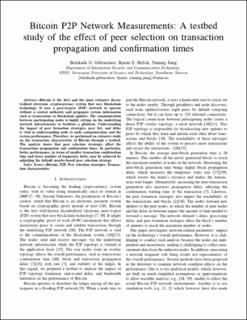Bitcoin P2P Network Measurements: A testbed study of the effect of peer selection on transaction propagation and confirmation times
Peer reviewed, Journal article
Accepted version
Permanent lenke
https://hdl.handle.net/11250/3057361Utgivelsesdato
2022Metadata
Vis full innførselSamlinger
Originalversjon
IEEE Transactions on Network and Service Management. 2022, . 10.1109/TNSM.2022.3216955Sammendrag
Bitcoin is the first and the most extensive decentralized electronic cryptocurrency system that uses blockchain technology. It uses a peer-to-peer (P2P) network to operate without a central authority and propagate system information such as transactions or blockchain updates. The communication between participating nodes is highly relying on the underlying network infrastructure to facilitate a platform. Understanding the impact of peer formation strategies, peer list, and delay is vital in understanding node to node communication and the system performance. Therefore, we performed an extensive study on the transaction characteristics of Bitcoin through a testbed. The analysis shows that peer selection strategies affect the transaction propagation and confirmation times. In particular, better performance, in terms of smaller transaction confirmation time and lower number of temporary forks, may be achieved by adjusting the default nearby-based peer selection strategy.

